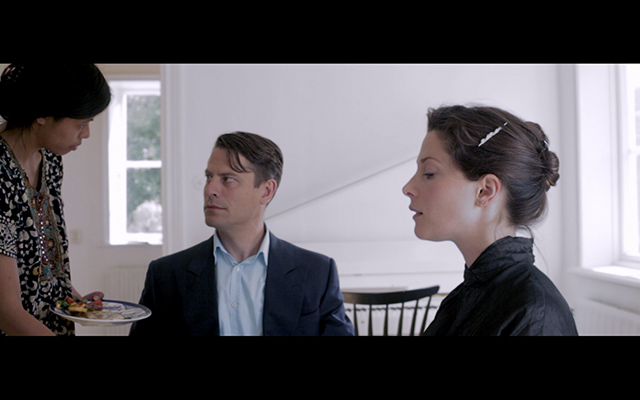O, a three channel video installation, revisits the old European literary genre of the “bourgeois portrait” and insists on its ghostly actuality as a diagram of both intimate and historical relations. Situated in Sweden, it tells of a love triangle involving a young, wealthy, newly wed couple and their female domestic worker of color, with whom they share everyday life on their estate. The idyllic image and the particular social order represented here comes at the price of frequent outbursts of psychological and physical violence, and the routines performed gradually reveal themselves as a normative “script” full of implicit agreements in which the characters mutually objectify each other, thus entrapping each other in psychological double binds. In this constellation, the female domestic worker is both an object of violence and a projection surface for the white woman’s desires. O is a work about the place of intimacy and desire within a setting of structural violence, and the resulting dependencies and ambivalences in the relation between victims and perpetrators.
Receding Triangular Square is a new work created in collaboration with the psychoanalyst and cultural theorist Leon Tan. It explores forms of detachment and alienation as experienced in mental despair and psychological illness, but also on a historical scale through the long-lasting destruction of culture under colonial subjugation. The work juxtaposes traditional healing methods from Taiwan’s aboriginal cultures, as well as Daoist rituals, with Western-style psychiatry. Rituals as well as psychiatric treatment are different ways of “undoing detachment” and “repairing the web of time that has been broken” (Chris Marker in Sans Soleil). RTS investigates different ways of crossing boundaries to the “other side”—the side of re-connection, where broken relations and detachments can be restored. This “other side” is the side of the psyche, of unspeakable experiences, or the side of the ancestors and “spirits”—but our connection to this side is no longer taken for granted. It has to be questioned, made or re-made. The work reflects on this making and unmaking.
Virlani Hallberg, born 1981 in Indonesia, lives and works in Berlin and Stockholm

